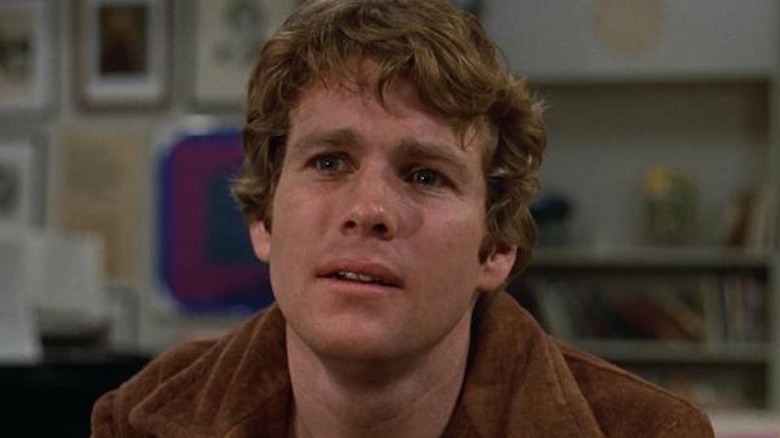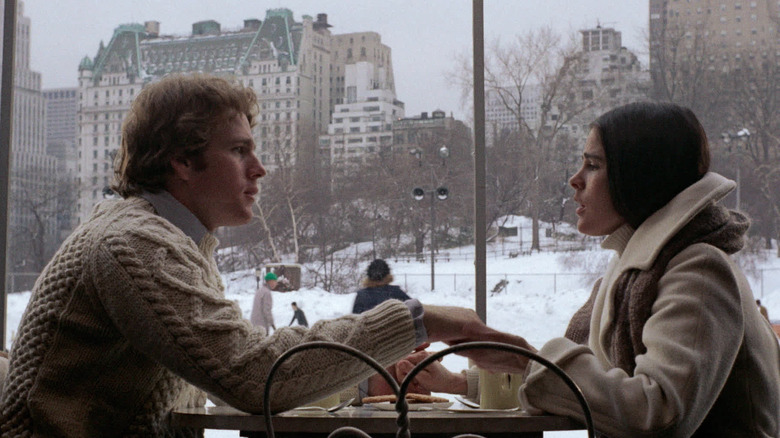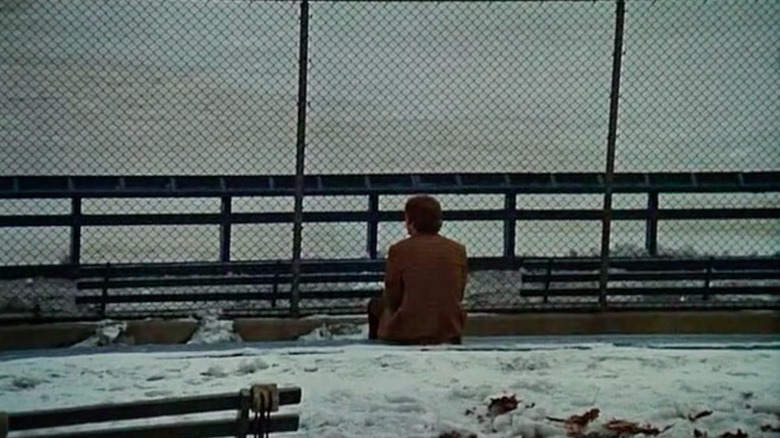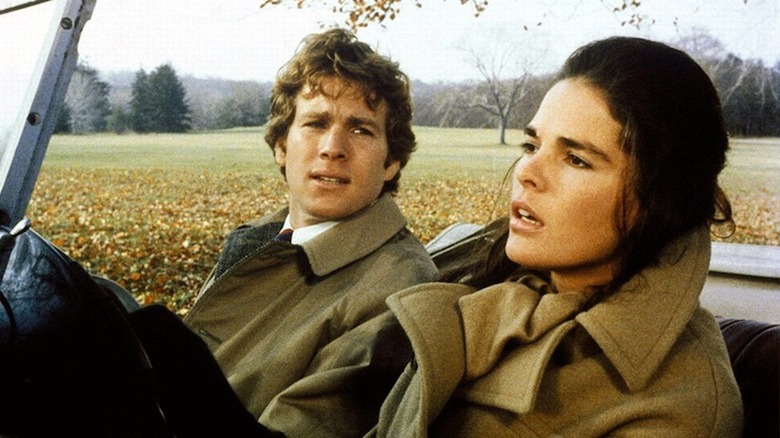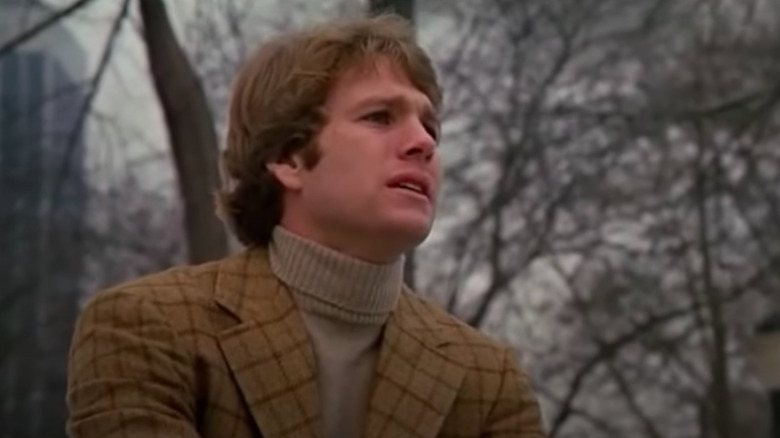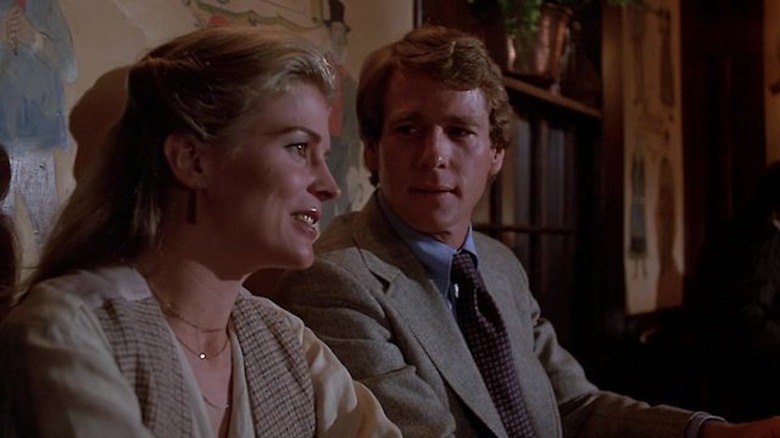Love Story Ending Explained: What Love Really Means
When people think of open-air ice skating in New York City, well, they probably conjure up the festive Christmas-y confines of 30 Rockefeller Plaza. Unless they're old. Baby Boomer old. For members of the generation that protested the Vietnam War before turning into conservative zombies who treat Fox News as an informational IV drip, there is first and foremost the image of the late Ryan O'Neal's Oliver Barrett IV gazing forlornly at the Wollman Skating Rink in Central Park as Francis Lai's brilliantly overwrought main theme jerks tears from our ducts with a vicious intensity worthy of Pinhead.
Most Boomers won't get that reference. And for those born as early as the Reagan era who are generally incurious about movies, you probably haven't watched Arthur Hiller's "Love Story." It is a film of its time, but, oh, what a film it was, at least commercially. Based on Erich Segal's bestselling weeper of a novel about a rich boy-poor girl romance that ends tragically, the movie was a New Hollywood anomaly that can charitably be compared to a ruthlessly sentimental mugging like King Vidor's "Stella Dallas." Greenlit by hedonistic executive Robert Evans at the moment he was saving Paramount Pictures from financial ruin, it stood out from the heightened style of genre flicks like Roman Polanski's "Rosemary's Baby" or Peter Yates' "Bullitt" by being unabashedly what it was meant to be.
There's no subversion at work when a grief-stricken Oliver leaves the hospital room of a freshly expired Jenny Cavilleri (Ali MacGraw), verbally accosts his status-obsessed father (Ray Milland) and strides purposely to the rink where his wife once watched him skate. It's a skull-shattering cudgel of a finale, and it was effective enough to make "Love Story" the top grossing movie of 1970. Would you like to know more? There's precious little meat on this bone, but here goes nothing!
What you need to remember about the plot of Love Story
Oliver is the bright, beautiful heir of an old-money East Coast family. He attends Harvard College and is a standout player for the school's hockey team. He becomes smitten with Jenny (Ali MacGraw), the daughter of a blue-collar baker (John Marley). He's destined for Harvard law school, while she is eager to put her Radcliffe College classical music degree to use as a teacher. Oliver is a glowing exemplar of New England privilege, but he's sensitive. He leads with his heart, which infuriates his parents who want him to marry into more money. When Oliver announces he intends to wed Jenny, his family cuts him off financially.
Look, the movie works. We're as smitten with these kids as they are with each other, and as we watch them struggle to make ends meet, we really want to do bad things to Ray Milland. Amazingly, they pull through, with Oliver landing a high-paying gig at a corporate law firm in New York City. Alas, just when it appears they've weathered the worst, despite Oliver's family's cruelly punitive efforts, Jenny is diagnosed with terminal cancer.
The rest of the film is a predetermined wallow, but O'Neal and MacGraw play their sad-sack parts with emotive zeal. Our abhorrence of Milland goes nuclear when he unwittingly agrees to pay for Jenny's cancer treatment because Oliver lies to him about having knocked up another woman (something the patriarch clearly did during his backsliding days), but we know this is going south because Oliver's kiss-off line to his father is the poster's freaking tagline.
What happened at the end of Love Story
Jenny absolves Oliver of any guilt he might feel about contributing to their predicament before she dies. He meant more to her than her love of music (which diminishes her tremendously as a character, but, hey, we're here for Oliver's heartbreak, not her misfortune). Milland has a change of heart once he learns of Jenny's illness, and rushes (too late) to her bedside. Oliver confronts his father outside of the hospital. When Milland tells him he's sorry, the furious Oliver unleashes a full-scale nuclear strike of despondence at his pops, (which happens to be a passed-along piece of wisdom from Jenny).
"Love? Love means never having to say you're sorry."
What the end of Love Story means
Love means never having to say you're sorry? You sure about that?
It's a terrific quip, and it sure beats the hell out of Ray Milland (he hadn't been this distraught since hallucinating a bat killing a mouse on the business end of a long drunk in Billy Wilder's "The Lost Weekend"), but this sentiment goes sour when you mull it over for all of a nanosecond. Let's say you get into a heated argument, and you call your spouse's mother "a great big poopyhead." Let's take this a step further and say the matriarch in question is not "a great big poopyhead," but is, in fact, a loving woman who just happens to care for her daughter's future, and she's just a tad miffed that you've been squandering the kids' college fund at an off-track betting establishment (without doing the bare minimum of research on owners, breeders and jockeys, which any degenerate gambler will tell you is just throwing your money away).
I believe an apology is warranted at this point in time. Furthermore, I think Milland, within a minute of his son storming his way down 5th Avenue, came to his senses and decided Oliver's utterance was the dumbest thing he'd ever heard in his life (while still feeling not altogether great about Jenny having kicked the bucket).
What the cast and crew of Love Story said about the ending
Ali MacGraw is loudly on record as disapproving of the film's valedictory. As she told Town & Country in 2016:
"That moment absolutely shows that I didn't know anything about acting; any more seasoned actress would have said, 'What? This is rubbish.' But there I was, crying away in Boston. I think it's the opposite. If you've done something frightful to someone you love, you don't just say you're sorry; you change your behavior."
For his part, O'Neal didn't get the line upon speaking it, and as late as 2021, wasn't entirely sure what it meant. "Neither of us knew at the time. But over the years, we have come up with answers that ... I don't know. I had to say 'I'm sorry' a lot in my life, that's all I know!"
What the end of Love Story meant for the franchise
You can't have a meaningful discussion about ill-advised sequels without bringing up 1978's "Oliver's Story." Based on the equally ill-advised novel by Erich Segal, the film opens with Oliver hanging out at Jenny's burial, waiting bitterly for her coffin to be lowered into the earth. Francis Lai's theme kicks up once more, and the moviegoers that bothered to show up for this late-breaking sequel (there weren't many of them judging from the film's poor box-office performance) presumably broke into tears.
The rest of the 91-minute movie is a clinic in disastrous narrative decisions. Oliver mopes until he falls in love with the vapid heiress (a shame-faced Candice Bergen) of the Bonwit Teller department store fortune. The entire movie is about Oliver making peace with being a child of privilege, and learning to kind of love it. At this point, the "Love Story" franchise was as dead as Jenny, and no one was sorry about it.
